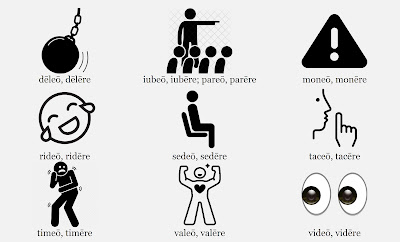[1] image #1: key terms commonly used in Latin grammar courses / textbooks
verb
conjugation
stem
infinitive
personal endings
subject of the sentence
subject pronouns
person
number
singular
plural
tense
present tense
principal parts
[2] There are four conjugations of the regular verbs;
conjugation refers to “groups” of verbs which have the same endings.
These conjugations are distinguished from each other by the
final vowel of the present conjugation stem; the stem refers to the verb
before any endings are added. This vowel is called the stem vowel*,
and is best seen in the infinitive; the infinitive refers to the
equivalent of English “to write”, “to go”, French “écrire”,
“aller”, and German “schreiben”, “gehen” (and, of course,
you can see where French got the -re ending from!)
*D’Ooge uses the term distinguishing vowel, which
means the same but the term stem vowel is more commonly used now.
Image #2: the infinitive of a verb of each conjugation, the stem, and the stem vowel.
[3] Image #3: to the stem, the personal endings are added:
-ō: I
-s: you (singular)
-t: he / she / it
-mus: we
-tis: you (plural)
-nt: they
[i] Knowing these personal endings is crucial since they
operate throughout the Latin verb systen i.e. they apply to all the
conjugations and all the tenses.
[ii] Although Latin does have pronouns i.e. the equivalent
of the English subject pronouns ‘I’, ‘you’ etc. they are most often not
used in Latin because the personal ending shows the subject of the
sentence i.e. the person / thing performing the action.
[iii] The verb is divided into [1] person, the term
used in grammar to refer to who is performing the action, and
[iv] number i.e. singular (one person
performing the action) or plural (more than one person performing the
action)
Singular
1st person: labōrō │ I work
2nd person: labōrās│ you (singular) work
3rd person: labōrat│ he / she / it works
Plural
1st person: labōrāmus│ we work
2nd person: labōrātis│ you (plural) work
3rd person: labōrant │ they work
[v] There are two forms of the second person i.e. ‘you’:
singular (talking to one person) and plural (talking to more than one person); unlike,
for example, French tu and vous or German du, ihr
or Sie where the choice of the second person pronoun can be dependent
upon a person’s status e.g. family member, police officer, Classical Latin does
not make that distinction: an Ancient Roman, whether talking to one emperor or
to one slave, would use the second person singular
[vi] Tense refers to the time when the action was /
is / will be performed. Here we are dealing with the present tense of
the 1st and 2nd conjugation verbs. In English there are
three ways of expressing present action. We may say, for example, I
live, I am living, or I do live. In Latin the one expression habitō covers
all three of these expressions.
[4] Images #4 and
#5: because verbs belong to different conjugations, they, like nouns, are
usually listed in dictionaries or vocabularies with specific additional
information which, for verbs, is known as the principal parts. For most
verbs there are four principal parts but, at this stage, only two will be
listed:
amō [first person singular], amāre [infinitive]; the number
of the conjugation may also be included
- amō, amāre [1]: love
- habeō, habēre [2]: have
1st conjugation
amō, I love; amāre, to love
arō, I plough; arāre, to plough
cūrō, I care for; cūrāre, to care
for
dēsīderō, I long for; dēsīderāre, to
long for
dō, I give; dare, to
give
habitō, I live, I dwell; habitāre, to
live, to dwell
labōrō, I work; labōrāre, to work
laudō, I praise; laudāre, to
praise
mātūrō, I hasten; mātūrāre, to
hasten
And the rest we will put in abbreviated form:
nārrō, nārrāre [1]: tell
necō, necāre[1]: kill
nūntiō, nūntiāre [1]: announce
parō, parāre [1]: prepare
portō, portāre [1]: to carry
properō, properāre
[1]: to hasten
pugnō, pugnāre
[1]: to fight
vocō, vocāre
[1]: to call
2nd conjugation
dēleō, I destroy; dēlēre, to
destroy
habeō, I have; habēre, to have
iubeō, I order; iubēre, to order
moneō, monēre
[2]: warn; advise
moveō, movēre [2]: move
pāreō, pārēre
[2]: obey
possideō,
possidēre [2]: possess
rideō, ridēre
[2]: laugh
sedeō, sedēre
[2]: sit; be seated
studeō, studēre
[2]: [i] dedicate oneself (to something) [ii] (Late / Mediaeval) study
taceō, tacēre
[2]: be silent
timeō, timēre
[2]: fear; be afraid
valeō, valēre
[2]: be strong / healthy / well
videō, vidēre [2]: see





No comments:
Post a Comment